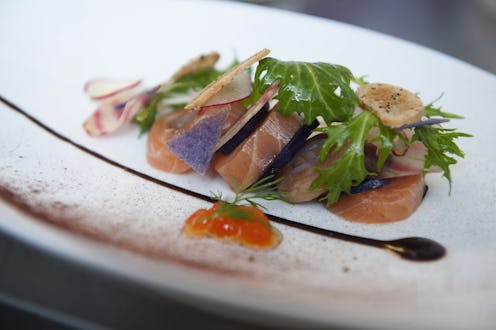News
Foie Gras Battle Reaches The Supreme Court
The U.S. Supreme Court may have ducked out of any more cases for its 2013-2014 session, but California's ban on foie gras may be served up in the next one. Thirteen states are calling the law, which forbids the force feeding of ducks and geese, unconstitutional, saying that the ban interferes with interstate commerce and agriculture.
The bill's official language states that “a product may not be sold in California if it is the result of force-feeding a bird for the purpose of enlarging the bird’s liver beyond normal size." The ban was signed into law by Arnold Schwarzenegger in 2004, but didn't go into effect until two years ago. Though not heavily enforced, violators could face fines of $1,000 per sale per day.
The 13 states backing the case say that the ban restricts legal production in other states, ultimately hurting business for farmers outside of California. attorneys for the states in a supporting brief that the issue "is of exceptional importance to the preservation of state sovereignty." Plaintiff's lawyer Michael Tenenbaum told McClatchy's that the it adversely affects commerce. “While some in the California Legislature may think that they have the power to tell farmers in other states what to do, at least 13 other states recognize that this unconstitutionally interferes with interstate commerce.”
The state prepared a 14-page brief defending the ban, writing: “State laws prohibiting the sale of products based on concerns about animal welfare, or simply on a social consensus concerning what is appropriate, are not unusual." It cited horse meat bans as an example.
None of the states involved with the case currently produce foie gras, but many of them — Kansas, Missouri, Georgia, Oklahoma — are heavy hitters in beef, pork, or poultry production. They fear that the agricultural restrictions could spread and lead to further animal rights laws.
"These states want to force California to allow the commerce in substandard and cruel products that the Golden State has rightly determined to be repugnant to its values," Paul Shapiro, vice president for farm animal protection at the Humane Society of the United States, told the LA Times .
Even after the ban went into effect, sneaky restauranteurs have been doling out the duck by giving it to customers for free rather than selling it. Just last week, 50 lucky winners of a Facebook contest enjoyed foie gras on the house at La Toque restaurant in Napa. They had to post on “why California’s foie gras ban is foolish.”
